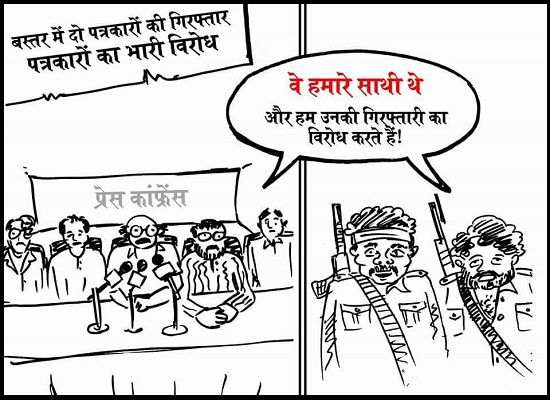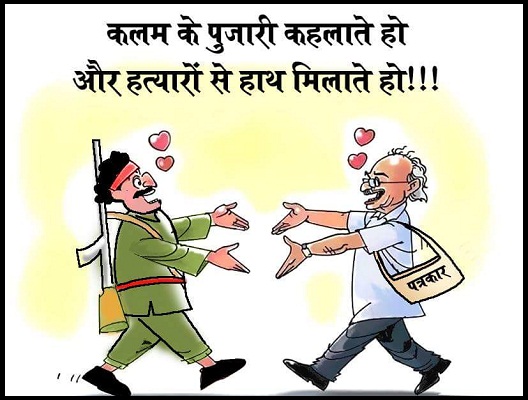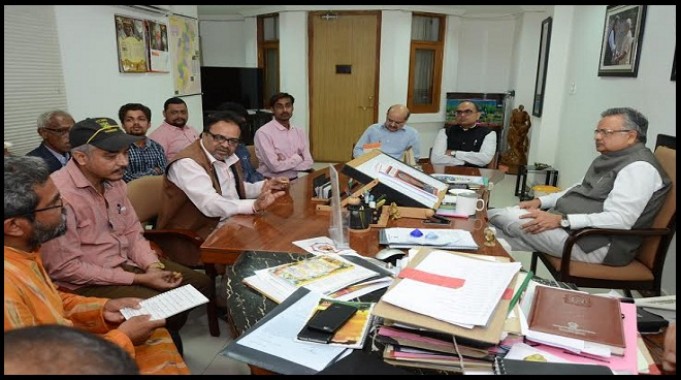CM Raman Singh promises release of scribes in jail
In October, the arrests of two young rural Hindi journalists in Darbha, South Chhattisgarh, in July and September by the police on charges of supporting Maoist rebels, galvanised the state’s journalists into demanding a secure work environment. Through protests and organising over the past two months, they laid out a series of demands and also asked that the two reporters Somaru Nag and Santosh Yadav be released, in the absence of any evidence against them. As protests intensified, a worried Chief Minister Dr. Raman Singh finally reached out to them over the past weekend, asking for dialogue. Kamal Shukla, Kanker-based editor of Bhumkaal Samaachar speaks to Chitrangada Choudhury on the journalists’ meeting on December 22nd evening with the CM, and their plans for future action.
How did the December 22 meeting with the Chief Minister, Dr. Raman Singh come about?
Following Santosh and Somaru’s arrests, we decided we journalists must speak out against the deteriorating work environment and growing police harassment, especially in Bastar. We held a large protest in Raipur on October 10. We marched to the CM’s House but were not allowed to meet him. We gave the government our demands, as well as issued an ultimatum to release Santosh and Somaru within a month. Since there was no response from the government, we announced a Jail Bharo Andolan in Jagdalpur on December 21, and formed a new body called Patrakaar Suraksha Kanoon Sanyukt Sangharsh Samiti (United Struggle Body for a Journalists’ Security Law). As the day approached, between 450 and 500 journalists from all over the state started gathering in Jagdalpur. This worried the CM, and he called us for dialogue. 15 of us met him for an hour yesterday evening in Raipur. In the meeting, he acknowledged that there had been mistakes from the government, and this deterioration in relations between the media and the police was very harmful for the state. There were 4 senior government officers present, and he has directed them to take action on our demands.

Cartoon which lampoons the relationship of journalists and Maoists, circulated by the police in Chhattisgarh
What concrete action has he promised?
Regarding Somaru and Santosh’s release, the CM has promised that the government will work to find a route for their speedy release. He also agreed to our demand that the government form a committee made up of senior officials and 5 journalists. The work of this committee will be to examine and act on issues faced by the media, and enquire into the cases of any journalists booked by the police. We were adamant that the media representatives on the committee should be field reporters, and not owners or editors. He has agreed to this. In addition, we had asked that Sai Reddy and Nemichand Jain (two journalists who were killed by Maoists) be given the status of martyrs, and their families receive government benefits such as a job, health insurance. We also asked that all working journalists in the conflict areas who get injured or killed get this status as well as any government benefits that are currently extended to other martyrs. He agreed to formulate a policy for this. Some police officers were circulating derogatory cartoons about journalists in the last 2 days on Whatsapp platforms, which were depicting us as being hand-in-glove with the Maoists (The Hindu today reported that a senior police officer in Sukma district of South Bastar first circulated these cartoons). We protested against this too to the CM. He said he will ensure this vitiating of the atmosphere does not continue, and that journalists have a proper working environment to do their job.
You had also demanded a specific law to cover journalists in Chhattisgarh, especially those working in the conflict zones, and protect their work?
Regarding a law to protect journalists and our work, he asked us for a draft of such a law, or a copy of a similar law from any other Indian state. With the help of the People’s Union for Civil Liberties, we will prepare such a draft and give it to the government by the end of January. Then we will work with the government to finalise and enact it.

What has been the impact of these protests of the last two months on the state’s journalists?
We have abandoned our fear. We now have a new understanding of our power, if we become united and demand our rights. We are enthused and will continue to engage with the government, track them on the promises made yesterday, and push them to act on issues that affect all working journalists in the state. We want to work independently, and without any fear of harassment.
(Chitrangada Choudhury is an Orissa-based multimedia journalist and researcher, and a Fellow with the Open Society Institute -suarukh@gmail.com)







